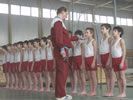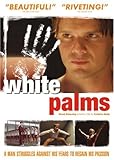Eye For Film >> Movies >> White Palms (2006) Film Review
The traditions in East and West for training gymnasts have been long known but perhaps never more starkly portrayed than in White Palms.
Based on autobiographical elements involving his brother (and the film's star), Hungarian director Szabolcs Hajdu, brings us a tale of a gold medal standard gymnast, initially training at age ten under a regime of brutal corporal punishment, then later adapting with difficulty to very different attitudes in Calgary, Canada.

As a boy, Dongo (played by athlete Zoltán Miklós Hajdu) receives little mercy in the hands of his trainer. The boys are asked to line up, but Dongo's feet are a fraction over the drill line, and he is punished with a blow from the side of a sword which leaves a blood-stained bruise on his thigh. When questioned, he tells his parents that he has thrown a knife at the girls, as they think he is lying when he claims his punishment was only for a minor incident. Parenting seems authoritarian and distant, although they don't hesitate to show off his athletic skills to relatives, and Dongo is forced to 'perform.' A background song later intones, "Summer has flown, far has it gone, over, all over, and I still question why." For Dongo and his classmates, it must seem that the joys of summer have eternally left their lives; and when he arrives late one day for practice, fearing the chastisements that will surely follow, he runs away.
In the Canadian scenes, the shortcomings of the Western system are equally challenging. With little in the way of sanctions for unruly students, teachers are stretched to cope with rudeness and laziness. Through a friendship with a younger athlete, Dongo not only learns to look at the world through new eyes but finds a part of himself that has long been abandoned.
White Palms is carefully edited to juxtapose more than one edge-of-the-seat moment. Tension is skilfully built into a story that is part documentary, part drama, and casting real gymnasts adds to the feeling of authenticity. Stark contrasts in the use of colour emphasise isolation - cold bluish tones for the scenes in Hungary are punctuated only with the bright red of the girls' outfits (in a sectioned-off area of the gym). Before going to Canada, Dongo's only venture into the latter world of brightness is when he is humiliatingly punished, providing a spectacle for the girls. The soundtrack has some haunting songs, although I felt the opening music was off-key - possibly intentionally - which I found a bit off-putting.
White Palms brings some emotion-laden content to a fairly dry subject, as well as providing useful contrasts between the former Soviet bloc and the modern Western way of thinking. It might not make the mainstream market, but is a very watchable contribution from Eastern European cinema.
Reviewed on: 07 Sep 2006

















